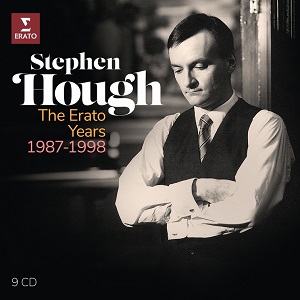Stephen Hough hat einige Jahre lang für EMI, Erato und Virgin Classics aufgenommen, eher er zu Hyperion wechselte. Das heute von Warner herausgegebene Label Erato bringt nun diese Aufnahmen unter dem etwas irreführenden Titel The Erato Years heraus.
Mit einer sehr betonten Kontrastierung der lyrischen und dramatischen Passagen werden die beiden Brahms-Konzerte sehr gut interpretiert. Das hoch sensible Spiel des Pianisten und das außergewöhnlich gute BBC-Orchester unter Andrew Davis lassen diese CD interessant werden. Es gibt sicherlich noch bessere Aufnahmen der beiden Werke, aber diese hier sollte man definitiv nicht verachten.
Das exakte Gegenteil gilt für die Einspielung der Klavierkonzerte Nr. 9 und 21 von Mozart, in denen Stephen Hough und das von Bryden Thompson uninspiriert geleitetet Hallé Orchestra nur Lieblichkeit produzieren und die Kontraste und das Drama der Musik völlig unbeachtet lassen.
Stephen Hough ist als exzellenter Liszt-Interpret bekannt, und die beiden Schallplatten von 1987 und 1991 werden uns nicht das Gegenteil behaupten lassen. Elektrisierend und vor allem brillant farbig in den virtuosen Stücken, poetisch in den ruhigeren Kompositionen zeigt Hough sehr gut die beiden Seiten von Liszts Seele.
Wenn Schumanns Davidsbündlertänze von der Atmosphäre eines Polterabends inspiriert sein sollen, dann ist Stephen Houghs kontrastreiche, sehr farbige Interpretation absolut passend. Und wegen der betonten Kontraste und einer durchgehend sehr spannenden Wiedergabe ist auch die Aufnahme der Fantasie op. 17 ein hervorragendes Dokument aus Houghs früher Karriere.
Beeindruckende Zeugnisse von Houghs stupender Virtuosität und seiner schier unbegrenzten Farbenpalette gibt es auf den CDs The Piano Album 1 & 2. Aber es gibt auf ihnen auch ruhigere Stücke mit viel Charme.
Und dann ist da auch noch eine ganze CD mit Klavierwerken von Benjamin Britten. Stephen Hough, der von Ronan O’Hara in den Duos unterstützt wird, gelingt eine tadellose und geschmackvolle Interpretation dieser oft recht einfachen Stücke, die keinerlei Übertreibung, aber umso mehr wachen Geiste verlangen.
For a number of years Stephen Hough recorded for EMI, Erato and Virgin Classics, before changing to Hyperion. The Erato label, today belonging to Warner, is now releasing these recordings under the somewhat misleading title The Erato Years.
With a very emphatic contrasting of the lyrical and dramatic passages, the two Brahms concertos are very well performed. The pianist’s highly sensitive playing and the exceptionally good BBC Orchestra under Andrew Davis make this an interesting CD. There are certainly better recordings of the two works, but this one should definitely not be despised.
The exact opposite is true of the recording of Mozart’s Piano Concertos Nos. 9 and 21, in which Stephen Hough and the Hallé Orchestra, uninspiredly conducted by Bryden Thompson, produce only suavity, completely ignoring the contrasts and drama of the music.
Stephen Hough is known as an excellent Liszt interpreter and the two CDs from 1987 and 1991 will not let us say the contrary. Electrifying and above all brilliantly colored in the virtuoso pieces, poetic in the quieter compositions, they show very well both sides of Liszt’s soul.
If Schumann’s Davidsbündlertänze are supposed to be inspired by the atmosphere of a polterabend, Stephen Hough’s contrasting, very colorful interpretation is absolutely fitting. And because of the emphasized contrasts and a very exciting rendition throughout, the recording of the Fantasy Op. 17 is also an excellent document of Hough’s early career.
Impressive testimony to Hough’s stupendous virtuosity and his almost limitless palette of colors can be found on the CDs The Piano Album 1 & 2, but there are quieter pieces with plenty of charm on them as well.
And then there is a whole CD of piano works by Benjamin Britten. Stephen Hough, supported by Ronan O’Hara in the duets, succeeds in an impeccable and tasteful interpretation of these often quite simple pieces, which demand no exaggeration, but all the more alert spirit.


















